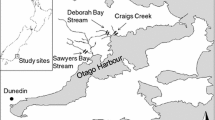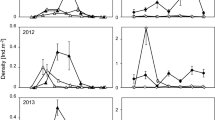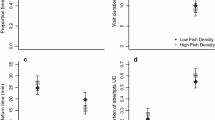Abstract
We investigated competition for food among two groups of six clone amagos (salmonids), Oncorhynchusmasoumacrostomus, in a laboratory experiment with different rates of food input. We examined the effect of temporal clumping of food resources on the inequality of food sharing between competitors. Monopolization of food by dominants was greater at a low input rate (one food item per 10 s) than at a high input rate (1 food item per 1 s). Aggressive behavior by dominants was more frequent at the low input rate than at the high input rate; its purpose was presumably to interfere with the feeding behavior of subordinates. We assessed the relative importance of three foraging factors (the number of approaches to food items, the chance per approach and the gain per chance) in enhancing inequality in food gain between individuals. Dominants had a disproportionately high chance per approach and gain per chance at the low input rate, but not at the high input rate. The chance of obtaining a food item per approach depended on how many competitors approached simultaneously. The gain per chance depended on the competitive ability of the approaching fish. There was an interaction between these components, such that the number of approaches affected the chance per approach and gain per chance. We evaluated the independent effect of the chance per approach, and showed that it was higher for dominants than for subordinates at the low input rate, but not at the high input rate. This implies that subordinates changed their behavior and became more likely to avoid approaching food at the same time as dominants at the low input rate.
Similar content being viewed by others

Author information
Authors and Affiliations
Additional information
Received: 13 August 1996 / Accepted after revision: 30 November 1996
Rights and permissions
About this article
Cite this article
Hakoyama, H., Iguchi, K. Why is competition more intense if food is supplied more slowly?. Behav Ecol Sociobiol 40, 159–168 (1997). https://doi.org/10.1007/s002650050329
Issue Date:
DOI: https://doi.org/10.1007/s002650050329



